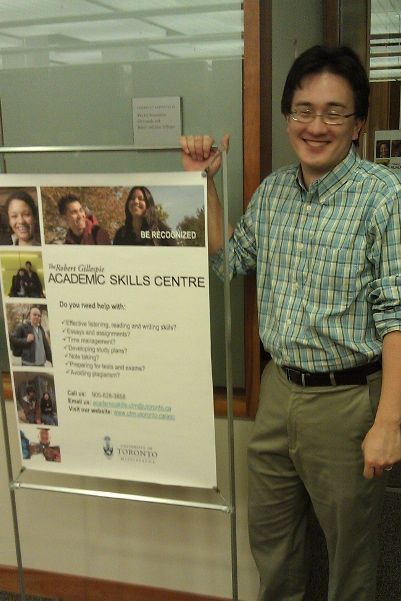Andrew Petersen, Robert Gillespie Academic Skills Centre
Andrew Petersen, Director, Robert Gillespie Academic Skills Centre, UTM
The Robert Gillespie Academic Skills Centre (RGASC) at the University of Toronto Mississauga was created 20 years ago to build a broad range of student academic skills. Located in the Hazel McCallion Academic Learning Centre (familiarly known as UTM’s Library), the RGASC has become a hub of support for undergraduates, faculty, graduate students, and transitional graduates looking ahead to their careers. One-on-one counseling sessions, workshops, and specialized programming form a base of support for core issues, while involvement in committees and programming allows the five full-time staff and faculty to support departmental and curriculum initiatives University-wide. Andrew Petersen, Senior Lecturer in the Department of Mathematics and Computer Science, joined the RGASC as Director in July 2012, and is looking ahead to developments to support the needs of UTM’s growing student population.
The current initiatives Petersen sees as providing core support for undergraduates are direct support through consultations and Facilitated Study Groups (FSGs) and indirect support, working with departments in broad-based programs like the writing initiative. FSGs, a peer-to-peer support program in which student facilitators (about 130 in total, operating in 30 courses) design and run specialized study sessions in courses where foundational skills need to be taught, typically in the 100- and 200-level. The writing initiative is also evolving this year, taking a more disciplinary approach with the aim of providing contextualized writing instruction to students and providing departments with stable, specialized and predictable support.
Over the next few years, Petersen would like to see more programming develop to support other key skills, like numeracy, as well as more specialized support for English Language Learners and for students transitioning to graduate school or into the workforce. In a broader sense, Petersen sees potential to build community at UTM around the RGASC’s many programs and wider outreach, and to create a supportive community for faculty in both their course development and their personal development as teachers.
What challenges do you see as most pressing for UofT students?
“It’s difficult to get an education apart from context. Students are working, they have family responsibilities, the economy is a worry. They’re thinking more and more about their future plans earlier than we’d expect, and so they’re changing the courses they’re picking, changing their co-curricular choices.”
How have students responded to your programming?
“The main issue we hear in feedback is the wait time for individual attention: many people come because they need help ‘now’, so there’s frustration in that we can’t see them immediately. But, there are others that become very regular customers.”
What do you think faculty might be surprised to learn about their students?
“I don’t think faculty realize just how much students are doing on campus, how many hours they’re spending with each other, in co-curricular activities.”
What could faculty do to support students in their courses?
“More accessibility to students. It takes time to reach out, but if students don’t think they can reach out, it gets in the way of learning. Anything faculty can do at the beginning of the course to show that students can get access to the resources they need is a big help.”
